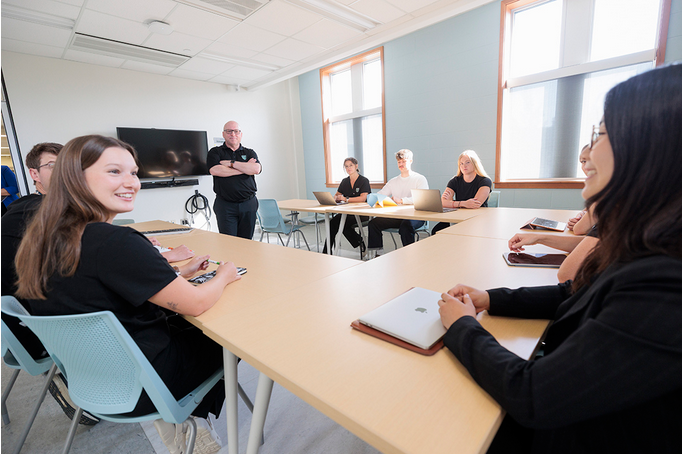Education
Saskatchewan Launches New Physician Assistant Program to Expand Healthcare

The University of Saskatchewan (USask) has officially launched its new Master of Physician Assistant Studies (MPAS) program, welcoming twenty students as part of its inaugural cohort. This initiative marks a significant advancement in the healthcare landscape of Saskatchewan, as it introduces a new healthcare professional role within the province, making it the first of its kind in Canada.
On September 12, the College of Medicine at USask held a ceremony to celebrate the start of the MPAS program. According to Saskatchewan’s Minister for Advanced Education, Ken Cheveldayoff, the program signifies the province’s commitment to enhancing education and addressing community healthcare needs. “This program reflects our commitment to expanding high-quality, locally delivered education,” he stated.
The MPAS program spans 24 months and aligns with the Government of Saskatchewan’s healthcare strategy. In March 2023, legislation was enacted to regulate the Physician Assistant profession, allowing PAs to practice in the province. The provincial government has invested $1.3 million in training professionals for these positions, with over $7 million allocated for the development of the program.
The launch ceremony included a traditional prayer delivered in Indigenous language by Elizabeth Duroche, Indigenous Coordinator at USask. She emphasized the importance of collaboration between Indigenous and non-Indigenous communities in healthcare initiatives, highlighting the program’s potential to impact community health positively.
Physician Assistants are healthcare providers trained to work under the supervision of physicians. They perform a variety of medical tasks, including patient examinations, ordering tests, and prescribing medications. This training enhances access to quality healthcare across Saskatchewan, particularly in primary care, emergency medicine, and surgical specialties.
The selection process for the MPAS program was competitive, with 20 candidates chosen from a pool of 340 applications. Notably, 75 percent of the selected candidates are Saskatchewan residents, with 15 out of the 20 applicants hailing from the province. “We are excited to support the growth of the Physician Assistant profession,” said Dr. Sarah Forgie, Dean of the College of Medicine, expressing enthusiasm for the diverse backgrounds of the students.
Some students will take on dual roles, working in clinical settings while also serving as instructors. These positions are designed to strengthen the educational experience and bridge the gap between the Saskatchewan Health Authority (SHA) and USask. Trainees must adhere to strict guidelines and can only perform procedures authorized by their supervising physicians.
Rachel Rosin, one of the MPAS students and a cardiovascular technologist, expressed her eagerness to contribute to the future of the Physician Assistant profession. “I look forward to being a member of the cohort helping to pave the way for the future of Physician Assistants in the province,” she said.
It is crucial to distinguish between Physician Assistants and Clinical Assistants, as the two roles have different qualifications and responsibilities. Clinical Assistants are trained physicians who have not yet completed all requirements for clinical licensing, allowing them to practice independently.
The history of the Physician Assistant role in Canada dates back to the Canadian Armed Forces in 1984, when the term “Physician Assistant” was first coined. This profession has since gained traction across the country, particularly after the military’s recognition of the need for such professionals.
Jeremy Cockrill, Saskatchewan’s Minister of Health, emphasized the importance of integrating Physician Assistants into the healthcare system. “Integrating Physician Assistants into our health system will improve access to a range of health services,” he said, noting that PAs will help physicians manage their patient loads more effectively.
The requirements for becoming a licensed Physician Assistant in Saskatchewan, as outlined by the College of Physicians and Surgeons of Saskatchewan (CPSS), include proficiency in English and a minimum of three years of active practice. Aspiring PAs must also demonstrate good character and adhere to legal and ethical standards.
The introduction of the MPAS program represents a significant step forward for healthcare in Saskatchewan, promising to enhance care delivery and improve health outcomes for residents. With a well-trained group of future Physician Assistants, the province is poised to address ongoing healthcare challenges effectively.
-

 Science3 months ago
Science3 months agoToyoake City Proposes Daily Two-Hour Smartphone Use Limit
-

 Top Stories3 months ago
Top Stories3 months agoPedestrian Fatally Injured in Esquimalt Collision on August 14
-

 Health3 months ago
Health3 months agoB.C. Review Reveals Urgent Need for Rare-Disease Drug Reforms
-

 Technology3 months ago
Technology3 months agoDark Adventure Game “Bye Sweet Carole” Set for October Release
-

 World3 months ago
World3 months agoJimmy Lai’s Defense Challenges Charges Under National Security Law
-

 Lifestyle3 months ago
Lifestyle3 months agoVictoria’s Pop-Up Shop Shines Light on B.C.’s Wolf Cull
-

 Technology3 months ago
Technology3 months agoKonami Revives Iconic Metal Gear Solid Delta Ahead of Release
-

 Technology3 months ago
Technology3 months agoApple Expands Self-Service Repair Program to Canada
-

 Technology3 months ago
Technology3 months agoSnapmaker U1 Color 3D Printer Redefines Speed and Sustainability
-

 Technology3 months ago
Technology3 months agoAION Folding Knife: Redefining EDC Design with Premium Materials
-

 Business3 months ago
Business3 months agoGordon Murray Automotive Unveils S1 LM and Le Mans GTR at Monterey
-

 Technology3 months ago
Technology3 months agoSolve Today’s Wordle Challenge: Hints and Answer for August 19









